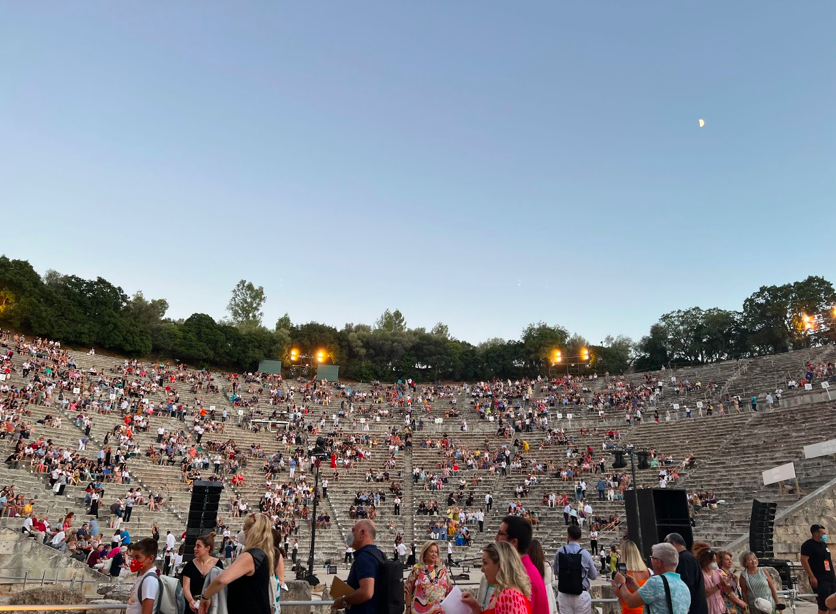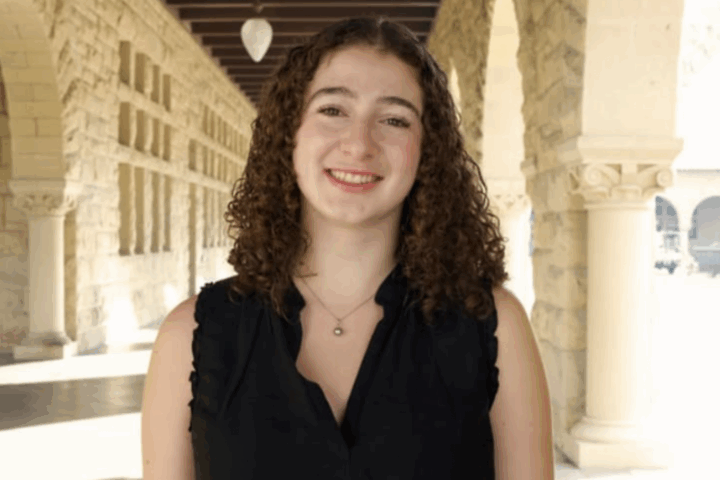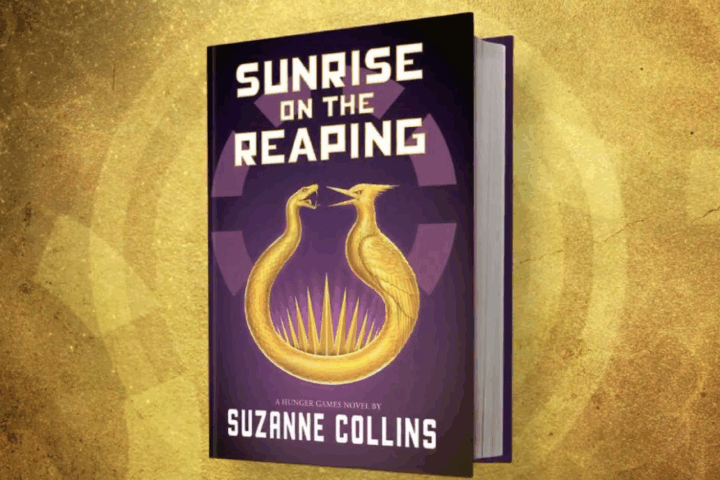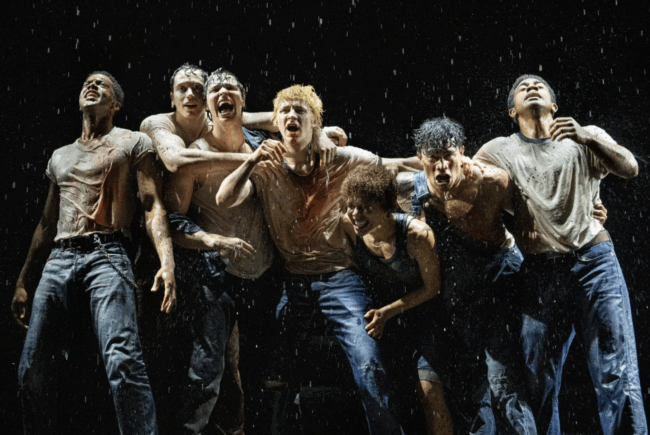The Ancient Theater of Epidaurus was built in the 4th century BCE atop Cynortion Mountain, near the Sanctuary of Asclepius, the Greek God of medicine. It is the best-preserved amphitheater in Greece, and with a capacity of roughly 13,000 people, it is one of the largest outdoor theaters in the world. The theater is renowned for its acoustics; in fact, it is said that if you drop a coin onto its stage, its echo can be heard all the way in the topmost row and beyond.
The annual Epidaurus Festival is a top-rated cultural tourist attraction, with people from all over the world attending every summer. It hosts everything from ancient plays to operas, and many great artists have performed in it, such as the Greek soprano Maria Callas. Typically, attendees stay in Nafplio, the closest city to Epidaurus, and drive to the theater shortly before showtime. Almost as amazing as the theater itself is the journey it takes to get there. Scattered across the road that joins Nafplio to Epidaurus are fascinating archaeological sites, remains of ancient edifices, beautiful mountainous landscapes and quaint old buildings.
An Ancient Greek tragedy can be a cathartic experience. The purpose of tragedy, argued Aristotle, was to cleanse the soul, rid us of petty worries, and teach us that there can be nobility in suffering. This summer, the festival staged several tragedies, including Alcestis and Helen by Euripides, The Persians and Agamemnon by Aeschylus, and Ajax and Antigone by Sophocles, the latter of which I attended on August 5. These works are timeless, as they capture the essence of human nature and enchant audiences to this day; after all, people still travel to Epidaurus to see them thousands of years after they were created.
In The Birth of Tragedy, Friedrich Nietzsche, a staunch philhellene, wrote that the works of Sophocles, in particular, were the apex of artistic creation. Sophocles was one of three Ancient Greek tragedians for whom any plays have survived, the other two being Aeschylus and Euripides. Sophocles was the most successful of the three, winning 24 Dionysian festivals, compared to Aeschylus’ 13 and Euripides’ 4. Antigone, the third play in the Theban trilogy, is arguably Sophocles’ greatest work. The play contains one of the most beautiful odes to love ever written: “Love, invincible in battle; you, who always prevails … you, from whom no one, God nor Man, can escape”. Many dramatists have produced adaptations of Antigone; for example, Bertolt Brecht staged a variation in which Creon was portrayed as a Nazi-style dictator.
Antigone concerns themes such as fate versus free will, the individual versus the state, femininity, hubris, and the nature of tragedy. Few works have been more rigorously analyzed. Is Antigone a heroine? Is Creon a villain? Is he deserving of sympathy? These are only a few of the many questions the play makes us ask.
There are few female figures in theater on par with Antigone in terms of bravery and determination. She courageously defied the King’s demands and in the end, got her way, having buried Polynices and accepted the consequences. The relationship between men and women is a primary theme in the play, particularly the dynamic between the sisters and the patriarchal state. In the first scene, Ismene remarks, “We are only women, we cannot fight with men, Antigone!” and later, Creon says, “No woman shall seduce us. If we must lose, let’s lose to a man, at least! Is a woman stronger than we?” In the end, Antigone breaks these preconceptions and dies a strong and independent person.
The role of the state is another important theme. While Antigone believes that the Gods’ desires supersede all man-made laws, Creon maintains that the law of the state is of primary importance. Creon defends his authority throughout the play, even saying that “the State is the King!” when challenged by Teiresias. Creon’s excessive pride and hubris do not go unpunished, as he is left miserable and alone at the end of the play, having effectively caused the deaths of his whole family.
This production of Antigone was conceptualized by the acclaimed Lithuanian director Cezaris Graužinis. His production, intended to resonate with modern audiences, presented the drama in a contemporary setting and included numerous innovative elements. For example, the chorus, representing the citizens of Athens, was made up of an unusually small group of seven people. They wore modern-day suits and top hats and oftentimes sang and danced together. Furthermore, the actors on several occasions broke the fourth wall, directly speaking to the audience as though they were members of the chorus. “The rationale of the performance,” said Graužinis, “was formulated with the aim of poetically reflecting the current new reality of society’s life and, in this new light, to reflect and explore the concepts of Ancient Drama, as well as to establish communication with the audience not only aesthetically or intellectually but also on an emotional level.”
Elli Tringou was superb as the title character. Her resonant and unwavering voice projected throughout the theater, from the moving interaction with her loving sister in the first scene, to when she triumphantly trod towards her death. Tringou’s Antigone was confident and strong as she boldly stood up to Creon, smiling as she exclaimed, “unhappy daughter of kings, your kings, led away to death… come: let us wait no longer”.
Vasilis Bisbikis, one of Greece’s finest actors, presented a stubborn and oppressive Creon. He was convincingly angry and irritable in his conversation with the edgy sentry, speaking the lines “your very voice distresses me” and “you talk too much” with a blend of exasperation and anguish, and fierce and forceful in his interaction with Antigone, standing by his law and sending her off to die. At the end of the play, overcome with regret and sorrow, he sat down with his head in his hands, whimpering as he said, “Lead me away. I have been rash and foolish. I have killed my son and my wife”.
Kostas Koroneou was an excellent sentry, providing comic relief as he nervously tip-toed across the circular stage, and Christos Sapountzis was pristine as the blind seer Teiresias, for instance when he loudly exclaimed, “You are sick, Creon! You are deathly sick!” Stratis Chatzistamatiou was notably wonderful as Haimon, Creon’s distressed son; in one of the most emotional moments of the play, he fell to his knees, shouting, “Ah! Who is it that’s talking like a boy now?” during his acrimonious dispute with his father. The dark music composed by Dimitris Theocharis and the remainder of the cast were superb, rounding out a fantastic performance.
An evening at the Epidaurus Theater is always a privilege and a pleasure to enjoy, but this Antigone made my experience all the sweeter.






